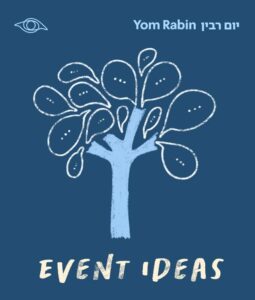How should I care for the people I love?
What’s a good life?
How do we disagree?
How do I face uncertainty?
These are the types of big questions that IYUN helps young Jewish adults explore through Torah study in a cohort setting. The organization trains educators around the country in its distinct approach that combines this study with Jewish community engagement facilitation. After training, educators lead cohort groups of 10-15 people, cultivating communities of depth and substance.
We wanted to share that we have had the most wonderful experience with this IYUN class. From the beginning, it was lively, with active participation and a lot of great ruach! But every week it gets better as people deepen their sense of friendship, understanding, and engagement…Through connecting in this deep and active way with Jewish wisdom, we are strengthening ourselves and our team, but also our families, friends, and community. —Molly Curren Rowles, Jewish Community Alliance of Southern Maine
In just its first few years, IYUN has trained 256 educators who have engaged 3,327 adults throughout North America. These learners are situated in over 100 communities — from Federation Young Adult Divisions to congregations, from JCCs to Moishe Houses, from Bases to Honeymoon Israel alumni groups, Repair the World Service Corps, and far beyond. IYUN’s distinct approach focuses on:
- Building community and a love of Jewish learning. IYUN carefully curates the members of each cohort with an eye toward deepening social relationships among participants and building long term community, not just “covering material.” With this approach, participants leave with knowledge, a group of friends, a relationship to a local educator, and a strong feeling of community.
- Focusing on Jewish texts because they inform liminal life moments. IYUN groups are often organized around significant life events – birth, death, marriage, building a home, embracing adulthood, conveying values and legacy – and cohort leaders seek out Jewish texts that speak directly to these most human phenomena. IYUN wants the cohort members to feel that their most profound human questions have been touched by the wisdom of Torah.
- Training local teachers to bring Jewish learning alive for our audience. IYUN offer both outstanding curricular delivery and also training — using the experience of forming and operating a learning circle as real-world practice for learning a set of teaching skills and a holistic community-building approach.
In the midst of raising a community of little kids, it can be really hard to find the time to have these types of conversations. I feel really grateful that I can bring these questions and make space for discussion for the folks in my community. —Dalia Shapiro (runs a Circle for fellow young parents in her living room)
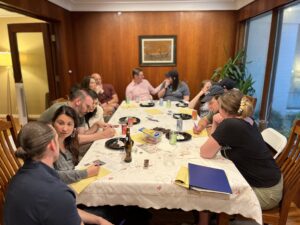
Returning Honeymoon Israel couples gather for an IYUN Circle on “The Home We Build Together” in Cincinnati.
Ninety-four percent of cohort members say that because of their IYUN circle, they want to continue learning Torah and Jewish texts. Many of these people are learners who previously were not reached by adult Jewish education programs. IYUN also partners with Jewish organizations and groups to offer Torah study as part of their regular “staff learning,” dialing up the Jewish confidence and fluency of their professionals. This includes new, unexpected networks like Jewish Employee Resource Groups (ERGs), who look to IYUN to create new curricular resources as they build community in the workplace.
Our vision is to make every community builder an educator, and every educator a community builder. We do this through partnerships where we train Jewish communal leaders in both the art of teaching and—simultaneously—the art of building community, as we have done with PJ Library, the Nachshon Project Graduate Fellowship, Hebrew College, Pardes, Atra: Center for Rabbinic Innovation, and many others. — Erica Frankel, Founder of IYUN
IYUN is excited about a number of emergent projects on the horizon, including the launch of the “Shabbat Hospitality Studio” curriculum this Fall, which will equip local leaders to build a culture of Shabbat home hospitality throughout their communities. And, on November 14th & 21st, the IYUN team will offer a two-part, virtual Masterclass in Relational Recruitment: How to Get the People in the Room — open to Jewish community builders of all experience levels and roles. Learn more and register before spots fill.
Learn about IYUN at iyun.community and reach out to them at [email protected] to explore building a community of meaning—whatever your setting. The Jim Joseph Foundation is a supporter of IYUN.
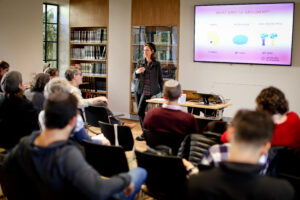 “More and more communities are reaching out looking for support and guidance,” said Dauber Sterne. “Conversations around Israel right now can either tear communities apart or strengthen connections and build mutual understanding. Educational leaders know they must engage in these conversations, and they want to—but doing it constructively and in a healthy manner takes an intentional approach and training.”
“More and more communities are reaching out looking for support and guidance,” said Dauber Sterne. “Conversations around Israel right now can either tear communities apart or strengthen connections and build mutual understanding. Educational leaders know they must engage in these conversations, and they want to—but doing it constructively and in a healthy manner takes an intentional approach and training.” 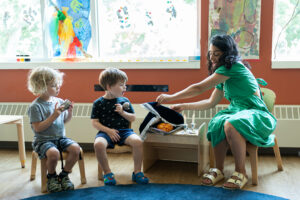 The three-year ElevatEd pilot focuses on 11-12 pioneer communities, with a goal of recruiting, training, and credentialing up to 30 educators in each community, amounting to more than 300 emerging early childhood educators in total. The five initial communities—Boston, Denver-Boulder, East Bay (California), Houston, and Long Island—will be joined by a
The three-year ElevatEd pilot focuses on 11-12 pioneer communities, with a goal of recruiting, training, and credentialing up to 30 educators in each community, amounting to more than 300 emerging early childhood educators in total. The five initial communities—Boston, Denver-Boulder, East Bay (California), Houston, and Long Island—will be joined by a  Jewish leaders and professionals across the country with skills to respond to flashpoint moments, build proactive relationships across lines of difference, strengthen Israel engagement, counter antisemitism, and build healthier and more resilient communities. RTT’s methodology is one of the most robust and effective approaches for facilitating challenging conversations in the country, recognized as best-in-class both within and beyond the Jewish world. By working closely with strategic partners such as Hillel International, Jews of Color Initiative, Foundation for Jewish Camp, rabbinical schools, Federations, BBYO, OneTable, Repair the World, Honeymoon Israel, and others, RTT is building a national field of trained facilitators and coaches to support productive discussion and inquiry on Israel and other important issues across Jewish life.
Jewish leaders and professionals across the country with skills to respond to flashpoint moments, build proactive relationships across lines of difference, strengthen Israel engagement, counter antisemitism, and build healthier and more resilient communities. RTT’s methodology is one of the most robust and effective approaches for facilitating challenging conversations in the country, recognized as best-in-class both within and beyond the Jewish world. By working closely with strategic partners such as Hillel International, Jews of Color Initiative, Foundation for Jewish Camp, rabbinical schools, Federations, BBYO, OneTable, Repair the World, Honeymoon Israel, and others, RTT is building a national field of trained facilitators and coaches to support productive discussion and inquiry on Israel and other important issues across Jewish life.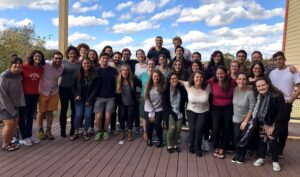 Given the tensions on college campuses, RTT’s partnership with Hillel has been especially important. Special training programs for Hillel staff—including facilitation training for mid-to-senior career Hillel professionals as well as early-career Hillel professionals—helped them facilitate student experiences to strengthen relationships and understanding across differences in this difficult year. Hillel International reports that next to increased security, Hillel professionals describe the tools RTT provides as their greatest need. Participating professionals were equipped with communication tools that helped them support Jewish students to feel less anxiety and trepidation when talking about Israel, antisemitism, and other charged topics; offer programs where Jewish students can feel safe to express what they’re experiencing and feel more strongly connected to Jewish life and to each other even across strongly differing perspectives; build trust with students who have felt alienated from Hillel in the past or during this time due to political differences; and navigate inter-group relationship-building with administrators, DEI departments, and non-Jewish student groups. As a result, on campuses where RTT has trained Hillel professionals over the past several years, students report relief and gratitude for the space to share their experiences and views on Israel and other tough issues, and to listen to their peers in turn. Hillel professionals report new and different students participating in Hillel programs, and improved relationships between Jewish and non-Jewish students even during moments of escalation
Given the tensions on college campuses, RTT’s partnership with Hillel has been especially important. Special training programs for Hillel staff—including facilitation training for mid-to-senior career Hillel professionals as well as early-career Hillel professionals—helped them facilitate student experiences to strengthen relationships and understanding across differences in this difficult year. Hillel International reports that next to increased security, Hillel professionals describe the tools RTT provides as their greatest need. Participating professionals were equipped with communication tools that helped them support Jewish students to feel less anxiety and trepidation when talking about Israel, antisemitism, and other charged topics; offer programs where Jewish students can feel safe to express what they’re experiencing and feel more strongly connected to Jewish life and to each other even across strongly differing perspectives; build trust with students who have felt alienated from Hillel in the past or during this time due to political differences; and navigate inter-group relationship-building with administrators, DEI departments, and non-Jewish student groups. As a result, on campuses where RTT has trained Hillel professionals over the past several years, students report relief and gratitude for the space to share their experiences and views on Israel and other tough issues, and to listen to their peers in turn. Hillel professionals report new and different students participating in Hillel programs, and improved relationships between Jewish and non-Jewish students even during moments of escalation coalitions, campuses, workplaces, and communities alike. This framework—crucial long before October 7th—will be ever more important to engage the next generation, combat polarization and hate, and ensure the resiliency of the Jewish community for years to come. RTT gives leaders the tools to address their deepest challenges while holding the difficulty and pain, building communal solidarity and care, and learning from people’s differences. With this approach, political differences evolve from a source of tension, anxiety, and alienation into an engine of communal health and cohesion.
coalitions, campuses, workplaces, and communities alike. This framework—crucial long before October 7th—will be ever more important to engage the next generation, combat polarization and hate, and ensure the resiliency of the Jewish community for years to come. RTT gives leaders the tools to address their deepest challenges while holding the difficulty and pain, building communal solidarity and care, and learning from people’s differences. With this approach, political differences evolve from a source of tension, anxiety, and alienation into an engine of communal health and cohesion.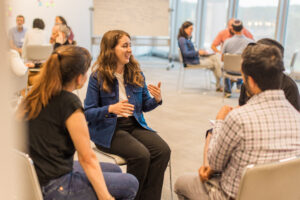 Atra helps rabbis learn how to engage people in new ways—both inside and outside of congregational walls—and strengthens connections among fellow clergy. More than 1,000 rabbis h
Atra helps rabbis learn how to engage people in new ways—both inside and outside of congregational walls—and strengthens connections among fellow clergy. More than 1,000 rabbis h communities’ needs and clearly define what excellent rabbinic leadership looks like. Key findings from Atra’s 2023 study showed that young American Jews want more experiences with rabbis because those interactions help them feel more spiritually connected and more connected to a Jewish community. Atra shared insights from the research about what factors make for positive interactions between young adults and rabbis, how these interactions help young adults feel more comfortable and confident being Jewish, and where rabbis can look to engage even more young people.
communities’ needs and clearly define what excellent rabbinic leadership looks like. Key findings from Atra’s 2023 study showed that young American Jews want more experiences with rabbis because those interactions help them feel more spiritually connected and more connected to a Jewish community. Atra shared insights from the research about what factors make for positive interactions between young adults and rabbis, how these interactions help young adults feel more comfortable and confident being Jewish, and where rabbis can look to engage even more young people.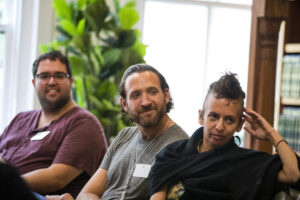 and in person, in hospitals and in recovery programs, in homes and in cafes, in Yeshivot and on street corners–everywhere that communities are found and built.
and in person, in hospitals and in recovery programs, in homes and in cafes, in Yeshivot and on street corners–everywhere that communities are found and built.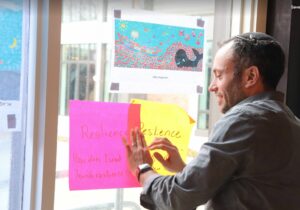 quality, meaningful, and engaging Yamim programs for students and communities.
quality, meaningful, and engaging Yamim programs for students and communities. In each Yamim training, M² crafted a deliberate and curated experience, from the design of the space – which was set up like an art gallery – to the balance between theoretical knowledge and hands-on work. Participants were introduced to the core idea of the training: using values to guide them through crafting the messages they want to convey in their commemorative ceremonies. The afternoon was dedicated to a lab session where participants crafted Yamim lesson plans, working collaboratively to brainstorm and test their ideas with each other. The centerpiece of the training was the Yamim Journal – a beautifully designed booklet curating about 100 different resources from both M² and other organizations, featuring lesson plans, art, media, music, conversation prompts and even step-by-step instructions for planning Yamim ceremonies. Participants said they appreciated its focus on art and poetry as points of entry for authentic discussions on difficult topics.
In each Yamim training, M² crafted a deliberate and curated experience, from the design of the space – which was set up like an art gallery – to the balance between theoretical knowledge and hands-on work. Participants were introduced to the core idea of the training: using values to guide them through crafting the messages they want to convey in their commemorative ceremonies. The afternoon was dedicated to a lab session where participants crafted Yamim lesson plans, working collaboratively to brainstorm and test their ideas with each other. The centerpiece of the training was the Yamim Journal – a beautifully designed booklet curating about 100 different resources from both M² and other organizations, featuring lesson plans, art, media, music, conversation prompts and even step-by-step instructions for planning Yamim ceremonies. Participants said they appreciated its focus on art and poetry as points of entry for authentic discussions on difficult topics.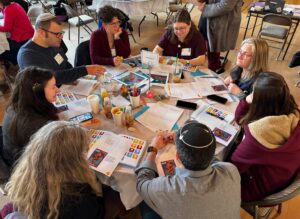 Participant
Participant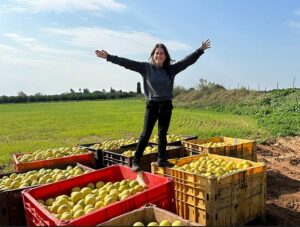 Birthright Israel educational components. This includes an orientation to prepare volunteers for their placements; Kiddush and Shabbat experiences; sessions where they can discuss and process their experiences, thoughts, and feelings; enrichment activities that provide respite, a sense of community, and mental release for the participants (including a workshop, a city tour, a meal at a restaurant, and other activities that support local businesses and the Israeli economy); a geopolitical lecture led by an expert with an overview and Q&A period; an activity with Israeli
Birthright Israel educational components. This includes an orientation to prepare volunteers for their placements; Kiddush and Shabbat experiences; sessions where they can discuss and process their experiences, thoughts, and feelings; enrichment activities that provide respite, a sense of community, and mental release for the participants (including a workshop, a city tour, a meal at a restaurant, and other activities that support local businesses and the Israeli economy); a geopolitical lecture led by an expert with an overview and Q&A period; an activity with Israeli 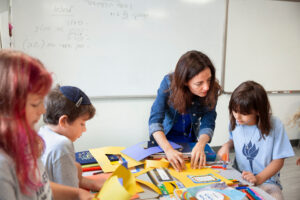 A key aim of the digest was to help the field improve its collective capacity to be smart consumers and users of research. All studies have limitations, and the digest illuminated those limitations without judgment. Interpreting sophisticated research for a general audience, and unpacking where data can and cannot be applied, aligns with CASJE’s mission to see research applied effectively. Examining study limitations in the digest also enabled the reader to answer critical questions: What do these findings mean for me and what I am trying to accomplish for the people I serve, in this place where they are, at this time that we’re in, and with the resources I have. To that end, CASJE also shared a discussion guide in each digest for use with colleagues to frame discussion about the featured studies and their applicability in various Jewish communal settings.
A key aim of the digest was to help the field improve its collective capacity to be smart consumers and users of research. All studies have limitations, and the digest illuminated those limitations without judgment. Interpreting sophisticated research for a general audience, and unpacking where data can and cannot be applied, aligns with CASJE’s mission to see research applied effectively. Examining study limitations in the digest also enabled the reader to answer critical questions: What do these findings mean for me and what I am trying to accomplish for the people I serve, in this place where they are, at this time that we’re in, and with the resources I have. To that end, CASJE also shared a discussion guide in each digest for use with colleagues to frame discussion about the featured studies and their applicability in various Jewish communal settings. outcomes. These grants are intended to stimulate research that investigates Jewish education and its effects, and that is well-positioned to inform practice. Previous Small Grants projects have investigated learning across the wide variety of settings where Jewish education happens and focus on learners of any age across the lifespan. Other current CASJE projects include its
outcomes. These grants are intended to stimulate research that investigates Jewish education and its effects, and that is well-positioned to inform practice. Previous Small Grants projects have investigated learning across the wide variety of settings where Jewish education happens and focus on learners of any age across the lifespan. Other current CASJE projects include its 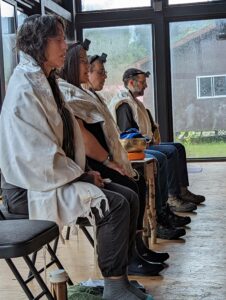 Of the more than 10,000 people IJS engages annually through its programs and resources, 90 percent of participants say that IJS supports their learning and growth. Eighty-eight percent express interest in further developing their Jewish spiritual practices.
Of the more than 10,000 people IJS engages annually through its programs and resources, 90 percent of participants say that IJS supports their learning and growth. Eighty-eight percent express interest in further developing their Jewish spiritual practices. 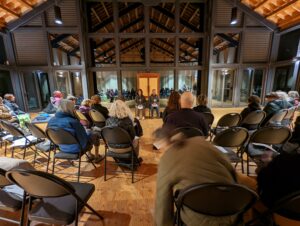
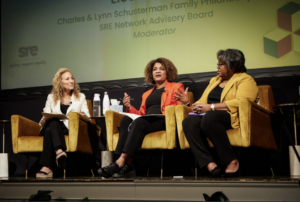
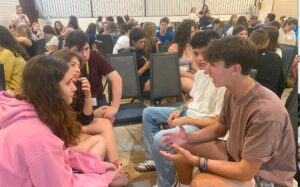 is designed to support organizations and individuals planning their own events around healthy arguments, with or without the initiative’s specific materials. A healthy argument can include a conversation in which two or more people disagree, but are able to learn something new about someone or something else; a conversation from which one learns something from a disagreement; a disagreement in which one learns something new about themselves, about someone else, or about a subject matter; or a disagreement where the goal is to learn something new, rather than to try to agree or convince.
is designed to support organizations and individuals planning their own events around healthy arguments, with or without the initiative’s specific materials. A healthy argument can include a conversation in which two or more people disagree, but are able to learn something new about someone or something else; a conversation from which one learns something from a disagreement; a disagreement in which one learns something new about themselves, about someone else, or about a subject matter; or a disagreement where the goal is to learn something new, rather than to try to agree or convince.